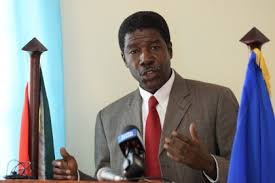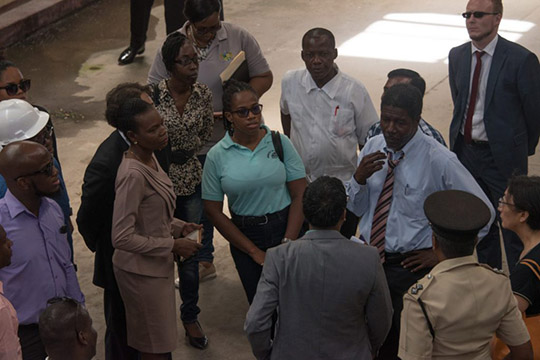REMARKS BY
OAS REPRESENTATIVE JEAN RICOT DORMEUS
ORGANIC, HYDROPONIC, AND HYBRID SYSTEM GROWING FOR CARIBBEAN SCHOOLS AND MODEL FOR LOCAL CARIBBEAN ENTREPRENEURSHIP
APRIL 27, 2015
Thank you Master of ceremonies
Honorable Minister of Agriculture Dr. Leslie Ramsammy,
CEO of NAREI and project coordinator Dr. Oudho Homenauth,
Project Manager Dr. Leighton Naraine,
Expert Stuart La Place,
Ladies and gentlemen,
I am delighted to be part of the opening ceremony of a workshop that sounds like a look into
the future: “Organic, Hydroponic, and Hybrid-System Growing for Caribbean Schools and
Models for Local Caribbean Entrepreneurship”. This workshop is part of the regional project
by the same name sponsored by the OAS. I see it as a major step forward because it comes to
providing effective training, skills and tools to schools, farmers, extension officers and
underprivileged groupings, thus contributing to empower them. In short, it is a project that
aims at creating entrepreneurs, disseminating knowledge while taking advantage of what we
have available and addressing the wider issue of climate change.
Let me thank the Minister of Agriculture, Dr Leslie Ramsammy for his invaluable support for
this initiative. I also wish to salute Dr Homenauth’s leadership to the project in Guyana. I am
glad the execution of the project in Guyana rests on NAREI, the premier organization
responsible for agricultural research, productivity enhancement, diversification of the non-
traditional crops sector, food security, prosperity and livelihoods of all, using technological
innovations in agriculture. Further, I acknowledge the vision and commitment of Dr. Naraine
and La Place who are instrumental in the design and implementation of this regional project.
The Organic, Hydroponic, and Hybrid-System Growing project uses synergies as a stepping
stone. Earlier I mentioned its beneficiaries, meaning vital components of the communities. I
need to add that the OAS also seeks collaboration between higher educational professionals,
community-based organizations, governmental ministries and non-governmental specialists
in sustainable development in participating countries for the dissemination of the model. Five
countries have been targeted for this regional undertaking that will span three years: St Kitts
and Nevis, Barbados, Guyana, Haiti and Trinidad and Tobago.
It all began as student-based research on sustainable agriculture within the Caribbean
Advanced Proficiency Examination (CAPE) program. It grew into a project concept that was
submitted to the Development Cooperation Fund of the OAS in November 2011. It was tested
through faculty and student-led community outreach in St. Kitts-Nevis and refined to a
streamline set of outputs and activities following peer review from OAS evaluators. The
project is expected to produce educational resource material and curriculum for use in
Caribbean schools, particularly those focused on technical and vocational training. It is
designed to be easily replicated in any country context.
It is auspicious that Guyana is one of the countries where the project is implemented. For it is
often considered that Guyana is the bread basket of the Caribbean because of its huge
potential; just imagine a Guyana where agriculture is fully developed, modernized and
enjoying best practices. What a tremendous impact that would have on the Caribbean region!
As the previous speakers mentioned, training is one of the main components of the project.
The focus of the curriculum is on “Non-Traditional Plant Growing Systems: Hydroponics and
Organoponics”. It can be utilized not only by students, but also by farmers or anyone wishing
to enter the workforce or entrepreneurship in agricultural production, as well to impact
innovations in sustainable agriculture.
The program seeks to develop the knowledge and skills required for construction and
operating shadehouse plant growing facilities with hydroponics and organoponics systems.
As such, it nicely complements efforts toward back yard gardening, family farming and youth
entrepreneurship in the agricultural sector.
The OAS is really pleased to accompany Guyana and NAREI in this undertaking. I hope Dr
Naraine and Mr La Place will find it rewarding and uplifting to share their experience, and will
inspire the whole region with this accessible and very effective technology.
In closing, I wish to renew the commitment of the OAS with sustainable development and
prosperity with equity, and the Development Cooperation Fund intends to support member
states in this regard.
Thank you. God bless you!


